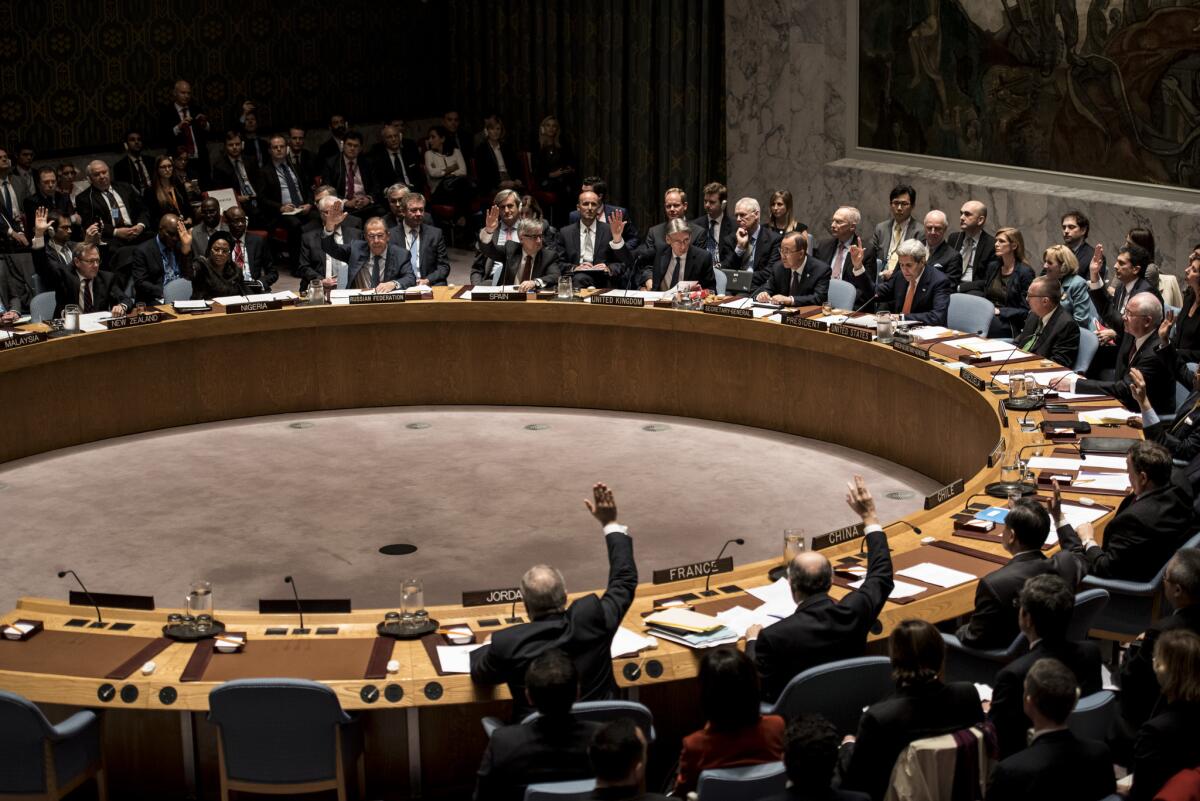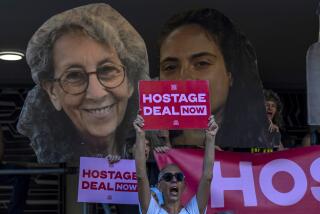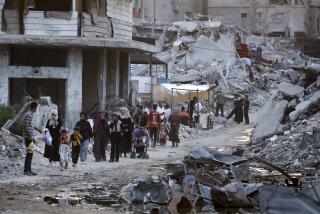U.N. approves a Syria peace process, but it doesn’t address Assad’s fate

The United Nations Security Council works toward a resolution on the Syrian crisis at its headquarters in New York. Secretary of State John F. Kerry called the resolution a “milestone.”
The United Nations Security Council approved a resolution Friday outlining a process to end the civil war in Syria, but without settling one of the most contentious issues: the fate of Syrian President Bashar Assad.
After five hours of discussion, all of the council’s members — some on opposing sides of the Syrian conflict — endorsed a plan that calls for cease-fire talks to begin next month and for U.N. supervised elections to be held in mid-2017.
The resolution acknowledges that the peace process will not immediately end the conflict because the proposed cease-fire does not stop the international airstrikes against what the measure calls terrorist groups in Syria, including Islamic State and Al Qaeda’s Al Nusra Front.
Ending the war, which has claimed about a quarter of a million lives and sent millions of refugees fleeing into Europe, is crucial to battling the even greater threat of the brutal Islamic State organization, the Obama administration argues.
The resolution urges the Syrian government and its opposition to embark, under the auspices of U.N. Secretary-General Ban Ki-moon, on “urgent” discussions of a “political transition process” for the country.
The resolution “is a milestone,” U.S. Secretary of State John F. Kerry, who led the talks with his Russian counterpart, said via Twitter.
But key differences remain over how and on what timetable Assad should be removed from power. Russia and Iran, his main allies, also refused to allow some representatives of his opposition to join any negotiations, saying they are terrorists.
NEWSLETTER: Get the day’s top headlines from Times Editor Davan Maharaj >>
Although Moscow and Washington have edged closer on some matters — Moscow allowing that Assad will probably have to go eventually, Washington allowing that he probably can stay a little longer than they originally hoped — they do not yet appear ready to agree on what a transitional government would look like.
“I think that Assad is going to have to leave in order for the country to stop the bloodletting and for all the parties involved to be able to move forward in a nonsectarian way,” President Obama said at a White House news conference as the talks got underway in New York. “He has lost legitimacy in the eyes of a large majority of the country.”
Still, he said, diplomacy might yet ease the Syrian conflict and allow the world to “turn to our No. 1 focus,” the destruction of Islamic State.
The lawlessness in much of Syria and neighboring Iraq has supplied the Islamic militants with a vast area to operate.
The resolution approved Friday endorsed a plan devised by diplomats from 20 countries in Vienna last month. It emphasizes that the final political decisions rest with Syrians, not outsiders. And it makes clear that a cease-fire would not apply to international military operations aimed at “terrorist organizations.”
That means the U.S.-dominated coalition may continue airstrikes against Islamic State targets in Syria. It also gives the green light to Russia, which has been accused of bombing an array of Assad’s foes, not just Islamic State.
Diplomats said a final list of which opposition organizations will be allowed to participate in the negotiations was still in the works.
Iran sought to discredit some of the opposition groups lined up against Assad. “Card-carrying members of Al Qaeda do not satisfy the conditions that we set for members of the opposition,” Iranian Foreign Minister Mohammad Javad Zarif told reporters ahead of Friday’s meetings.
Najib Ghadbian, the U.N. representative for the Syrian National Coalition, the main Western-backed opposition group, told reporters that a comprehensive solution to the conflict requires “the removal of all foreign troops from Syria, all of them,” including Russia, which began airstrikes there in September.
After meeting with Russian President Vladimir Putin earlier this week, Kerry acknowledged differences but said Washington and Moscow “see Syria fundamentally very similarly. We want the same outcome.”
In addition to atrocities and carnage since 2011, the fighting in Syria and Iraq has sparked a desperate exodus. Largely because of the Syrian war, the number of people forcibly displaced worldwide this year will surpass the record of 60 million, the U.N. refugee agency reported Friday.
tracy.wilkinson @latimes.com
ALSO
Pentagon chief says Iraqi strike may have been a mistake by both sides
Canada’s bilingual laws apply to tweets, too
Hong Kong netizens worry copyright bill will limit freedom of expression
More to Read
Sign up for Essential California
The most important California stories and recommendations in your inbox every morning.
You may occasionally receive promotional content from the Los Angeles Times.











